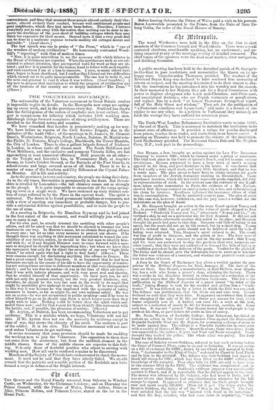THE VOLUNTEER MOVEMENT. The universality of the Volunteer movement in
Great Britain renders it impossible to give its details. In the Metropolis new corps are spring- ing up every week, and in the provinces every day. Scotland has shown that the fervid genius of the nation of emphatic men is not extinct. Glas- gow is conspicuous for infantry which includes 1200 working men. Edinburgh brings forward companies of strong artillerymen. These arc rivalled in the Scottish towns and counties.
We have remarked that London is prominently making up lee way. We have before us reports of the Civil Service Brigade, due to the initiative of the Audit Office ; of the meetings in St. James's, St. Clement ' Dane's, Westminster, Belgravia, North London, Dalston, St. Martin's-in- the-Fields, St. Pancras, King's College, Blackheath, the Tower Hamlets, the City of London. There is also a gallant brigade formed of Irishmen in London, in whose ranks all classes meet. The South Middlesex and West Middlesex, and the exclusive and pompous Victoria Rifles, are fast approaching at least numerical efficiency. Drill proceeds on all sides— in the Temple and Lincoln's Inn, in Westminster Hall, at Angelo's Rooms, in Lord's Cricket Ground, at the Barracks of the Foot Guards, in school-rooms and large covered areas of all kinds. There is to be a muster of some of the Southern and City Riflemen at the Crystal Palace on Monday. All is life and acfivity. As to the provinces, in town and country, the people are doing their duty. Aa in the old times, Devonshire is prominently in the front. But Devon- shire is rivalled by Lancashire—the tall chimney comes out as strongly as the plough. It is quite impossible to enumerate all the corps spring- ing up even in a single week. We have reckoned up sixty distinct cen- tres of corps referred to by the Times in the current week. The spirit is universal. The desire is to found permaneht battalions or companies, not with a view of meeting any immediate or probable danger, but to pro- vide a substantial defence against possibilities, and to train the people to the use of arms.
At a meeting in Belgravia, Sir Hamilton Seymour said he had joined in the first outset of the movement, and would willingly join with any one to carry it out.
For his own part, he utterly detested the meddling with other people's affairs, and all he asked was that we should be allowed to transact our own business in our way. In Heaven's name, let us-abstain from giving offence to every one ; but let us take every measure to _Fame our shores. If he thought there was anything in this movement calculated to wound the sen- sibilities of any foreign nation, he should be the last man to identify him- self with it ; or if any English Minister wore to come forward with a mea- sure so designed he should be for impeaching him ; but when we knew that the movement had only for its object the security of our own " tight little island," he asked again who had a right to find fault? (Mee's.) These were reasons enough for disclaiming anything like offence to France. He had a great respect for Louis Napoleon. It so happened that he had been fortunate enough in the course of his life to have the opportunity of render- ing not unimportant services to different members of that very distinguished family; and he was free to confess—it was in the time of their adversity— that it was with infinite pleasure, and with very great zeal and alacrity, that he availed himself of that opportunity. On their part, too, he met with not only the greatest courtesy, but the very greatest kindness ; and, therefore, he should be the very last man in the world to do aught that might by possibility give umbrage to any one of them. If he was speaking in this way it was because he was impressed with the necessity of taking measures to insure, as far as might be, our own national safety. He was not an orator—he was not accustomed to public speaking—and if he were to allow himself to eo on he should spin them a much longer yarn than they might ezieh to hear. Nothing could be better than the spirit which ani- mated them now; and'for that reason let them identify this movement with the habits, and, if possible, the pleasures of society. (Cheers.) Mr. Aryton, at Balaton, has been recommending Volunteers not to get uniforms. This is a mistake which, we hope, Volunteers will not fall into. If Mr. Ayrton does not see the necessity for uniforms except in time of war, that shows the obtuaity of his mind. The uniform is part of the soldier. It is his skin. The Volunteer movement will not suc- ceed unless Volunteers do get uniforms.
It seems necessary that some provision should be made for enabling the working men to join the Volunteers. The opposition to them does not come from the aristocracy, but from the snobbish element in the middle classes. Some of the middle classes are superior to this feel- ing. It is only those of doubtful position who object to serving with working men. How aid Can be rendered remains to be discovered.
Members of the Society of Friends have endeavoured to cheek the move- ment. It need not be said that they have utterly'failed. We should remark that the patriotic and sensible portion of the Rochdale men have formed a corps in defiance of the Bright interest






























 Previous page
Previous page